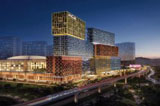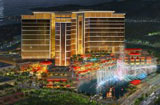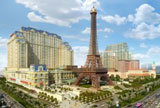The news item that emerged yesterday in local media was that eSun had, in effect, had its subsidiary’s claim for US$2.39bn in damages against New Cotai LLC thrown out by a Hong Kong court. The clarification provided by eSun last night was that this was technically not true. The judge had, in fact, only given a ruling at the pre-trial hearing. The case will still be heard in court. However, it is hard to imagine that the verdict will be much different, given the judge’s clear leanings in the pre-trial hearing, and the language he used: words like “untenable” do not bode well for eSun at the trial, and it does not take a genius to figure that out. Read the Macau Daily Times report here and see the eSun statement here.
And yet, this case probably still has a long way to go. The initial ruling must give the New Cotai side of the fight – David Friedman, former legal point-man for Sheldon Adelson at LVS – cause for cheer as it opens eSun up to counter-claims for legal costs and other expenses incurred if eSun is found to have been wasting everyone’s time with a frivolous lawsuit. But it can only be seen as round one of a tough fight, if both sides are determined not to back down. And in the meantime, the clock is ticking on the Macau government’s patience as the best piece of real estate in Cotai stands silent.
This impasse should have been broken awhile ago. Back in 2008, we understand, it seemed to be close, as New Cotai reportedly made an offer to eSun at HK$1,000 per square foot of developable space to take control of the project. eSun must have thought about this for a nanosecond before counter-offering at HK$400, in effect telling New Cotai to go to hell.
The picture that has emerged so far is a fuzzy one, and we do not want to speculate too much on it as that might get us into trouble. But here is what we can imagine having happened. A man who owns a prime piece of land in the middle of the biggest gaming market in the world (or soon to be) brings in a smooth-talking foreigner with tons of gaming experience and gives him and his equity partners effective control over the casino part of the project. The foreigner is smart enough to get an iron-clad contract and once the man realizes what he has given away, it is too late to undo it. But this being Macau, the man believes it’s never too late to change a deal and so the two start to quarrel: the man, quite logically, wants the foreigner to raise more money for the project’s financing. The foreigner wants to do it the American way, which is to raise it bit by bit as share prices and interest rates fluctuate, while the man wants the money in the bank pronto. An irresistible force meets an immovable object and here we sit today reading a High Court judge’s opinions on the matter.
Now what? Well, as far as we can ascertain, there is only likely to be one winner in this case and that is SJM. There has been much speculation about No. 4 playing a hidden hand by buying up the Passport Capital stake in eSun recently, in anticipation of buying one or both parties out of the deal. We find that theory not very credible, mostly because No. 4 is now no longer the dominant force in the empire. It would cause too much internal angst were No. 4 to try this solo or with a non-family partner, especially as No. 4 now owns a casino on the peninsula outright and has reportedly bought another piece of land on Cotai as part of a consortium.
Far more plausible is the scenario whereby the government waits a bit longer, sees no solution to the dispute between the partners coming anytime soon, and takes back the land with the objective of putting it out to tender again. It would be legally tricky, but possible. And in that case, as SJM management have already made quite clear, they would be ready to bid. It would be a no-brainer: armed with cash, a track record of stable development, a dedicated employer of locals – which government secretary could deny they are the best candidate? Moreover, given the choice of selling out to the foreigners or giving the land away to fellow patriots, we can see how the man might consider the latter the better long-term political option.
How soon might this all play out? That is another question. Taking the land would be easier than putting it back on the market. With Beijing watching very carefully, the government is likely to tread ultra-cautiously. It could still be years before we even see a land allocation, never mind commencement of construction. But by then, the light rail will be up and running and Hengqin will be coming up, ensuring the Lotus Bridge starts to live up to its potential as it carries tens of thousands of visitors a day right into the back door of the piece of land currently owned by Cyber One agents and called Macao Studio City. Stay tuned: there is much at stake still to fight for.
Used with permission and copyright to IntelMacau




















